CLIFFORD (1994)
A bratty 10-year-old boy is obsessed with visiting a dinosaur-themed amusement park. His uptight uncle takes the wily tyke in for a week, and barely lives to regret it.
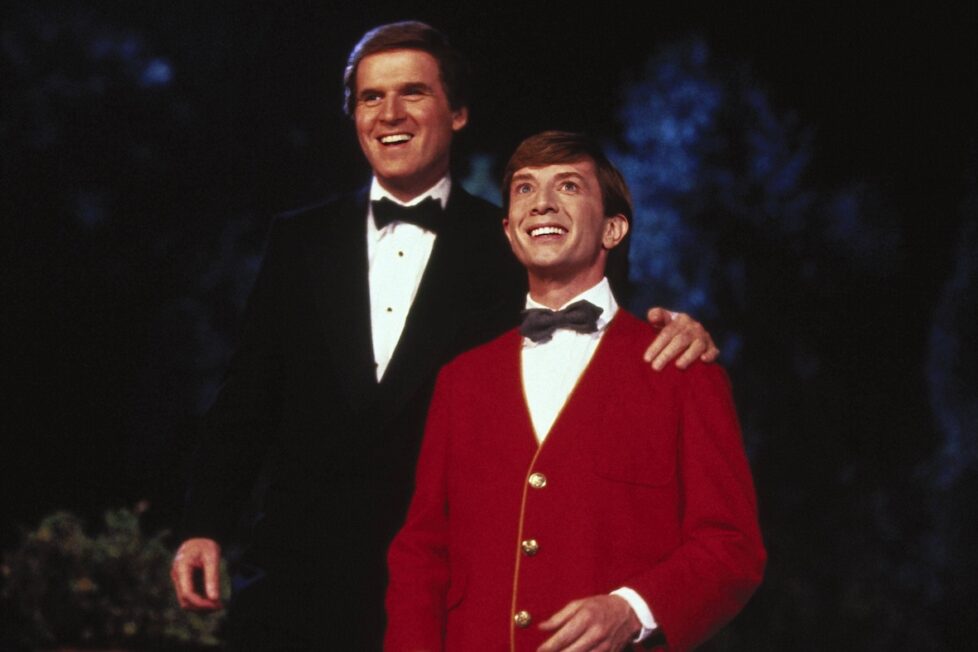
A bratty 10-year-old boy is obsessed with visiting a dinosaur-themed amusement park. His uptight uncle takes the wily tyke in for a week, and barely lives to regret it.


“You don’t know the first thing about Hitler- Clifford!” One of many acerbic outbursts from Charles Grodin, this could’ve been an apt tagline for the unassuming comedy. Critics were aghast, with a bewildered Roger Ebert saying:
“What we have here is a suitable case for deep cinematic analysis. I’d love to hear a symposium of veteran producers, marketing guys and exhibitors discuss this film. It’s not bad in any usual way. It’s bad in a new way all its own.”
Unusual to quote another review before even introducing the plot, but this ‘greatest worst film ever’ buzz precedes any discussion of Clifford. 30 years of interviews, behind-the-scenes footage, and celebrity endorsements have ensured the film’s legendary aura hasn’t faltered, although the “deep mystery” may not be as mystifying as it lets on.
William Porter and Steven Kampmann conceived a straightforward comic take on The Bad Seed (1956). 10-year-old Clifford nearly crashes a commercial airliner in an attempt to land near Dinosaur World, then workaholic Uncle Martin (Grodin) lies to his fiancée Sarah (Mary Steenburgen), claiming he’s ready for children, and agrees to look after him. When a work deadline scuppers their theme park trip, Clifford reacts with a terrible vengeance by destroying Martin’s life.
Clifford could have been the forerunner to the slew of 1990s child comedies if Orion Pictures hadn’t gone bankrupt. Shot in 1990, a belated release four years later found cinema became inundated with riotous kids. To name a few; Home Alone (1990), Home Alone 2 (1992), Honey, I Blew Up the Kid (1992), 3 Ninjas (1992), Dennis the Menace (1993), Richie Rich (1994), Baby’s Day Out (1994), and Blank Check (1994).
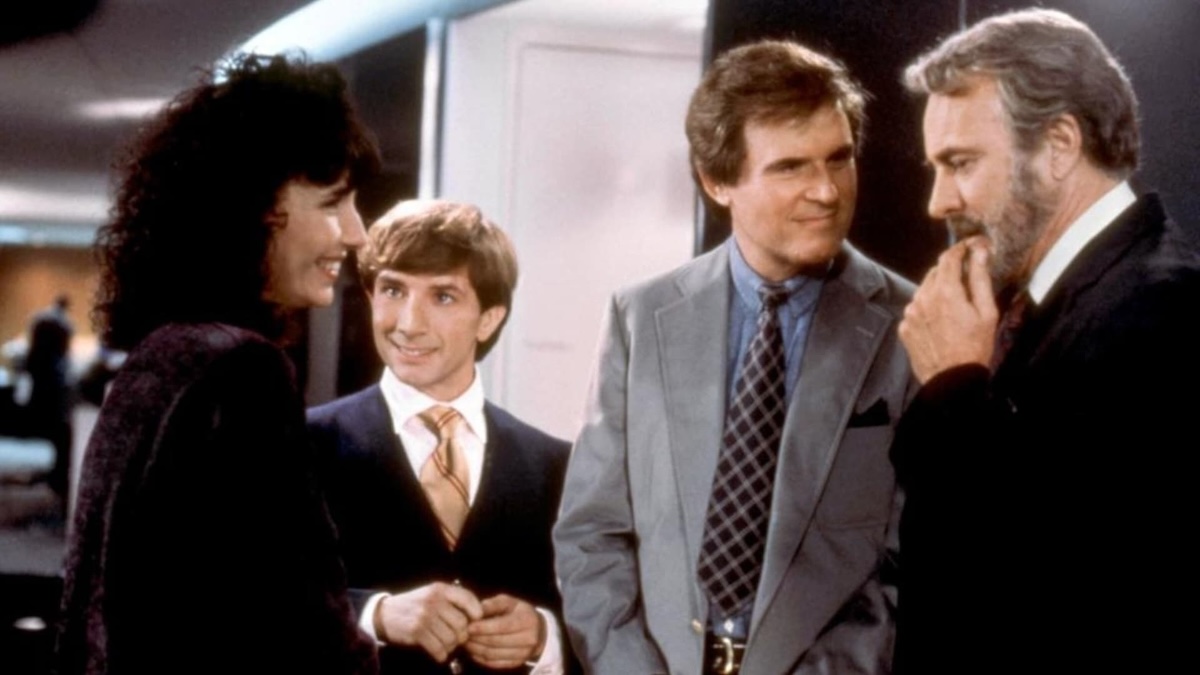
The production of Problem Child (1990) was the catalyst that spurred Porter and Kampmann towards a different approach: Martin Short. By the time of the reshoots, the actor was already 40 years old. Playing the child part. Marc Platt, the then-President of Orion, responded with a confident, “That’s either the greatest idea in the world or the worst idea in the world.” Having met in the comedy troupe Second City, Kampmann knew Short was a devotee of The Bad Seed and that Clifford would be right up his street. Short “wasn’t sure if this was just too insane an idea.” They shot a screen test where Short acted opposite Kampmann, which left Mike Medavoy, co-founder of Orion, declaring “This is going to make $100 million!”
“Who the fuck do you think you are” was the response director Paul Flaherty received on the comment cards for their first test screening of the finished film. Granted there were rave compliments yet between every “this is brilliant” and “this is genius” was a resounding “FUCK YOU.” Any constructive feedback? Composer Richard Gibbs recalled the overwhelming consensus was “they wanted the kid to die, and that was not, of course, the desired result.”
The negativity is not unfounded. The audience was simply empathetic with the film’s tone because every character has a strong desire to murder this ‘child’. I’m not exaggerating. Martin puts the boy’s life in mortal danger all because Martin Short is so effectively infuriating. Clifford’s own father (Richard Kind) grits his teeth and cries out, “IS THERE NO END TO YOUR MADNESS?” This is only their introduction. Looking back, Kind makes the astute observation that “those are words you don’t say to a child, you say that to an adult playing a child.” The initial impression audiences have is one of utter confusion: anyone would respond with anger towards such a petulant child. The second impression is that Short comes across as an alien trying to imitate human children.
There are no special effects or camera trickery, despite the highly qualified cinematographer John A. Alonzo (Chinatown, Scarface, Harold and Maude) being on board. Actors stood on milk crates above Short in oversized clothing. Producer Pieter Jan Brugge shrugged, “You either accept the concept, or you don’t.” The success of the film rests entirely on Short’s performance. If you’re properly prepared before viewing, Short’s energetic acting will hit you like your first sip of whisky. Like seeing two drunks arguing in the street, the anticipation that Martin and Clifford are about to come to blows is strangely magnetic. Watching Clifford under the influence might be the best course of action.
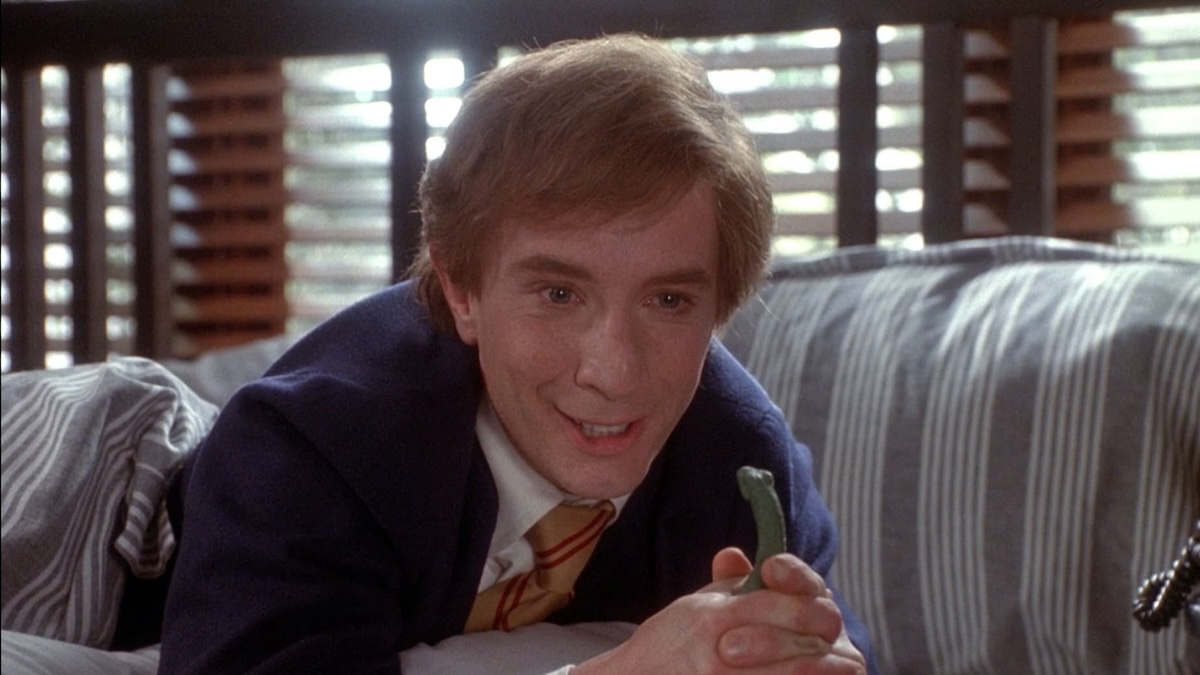
Clifford impishly warns his dad he might have a stroke while pecking at the arm of his alcoholic mother, whom he refers to as “Oh, sweet one who birthed me!” Before turning off the aeroplane’s engines, he makes his way down the aisle with arms wide open, smacking every passenger on the head. Even when Clifford’s just sitting there, Short bores into your soul with a decisive stare of perpetual malice. If Damian from The Omen (1976) acted this way, you’d think he’d want to get caught out.
Waiting in the airport backroom beneath a homemade banner that reads “I love you Uncle Martin,” Clifford feigns a jolt awake with a dramatic “Please don’t reject me!” Gibb’s angelic theme is so comically saccharine that it makes me wonder if this overly sentimental introduction might have been a better starting point for Clifford’s arrival. After all, we know going into this type of film that the boy is going to be a little terror. The joke is on Martin being woefully unprepared. But a hint of genuine innocence from Clifford would have drawn the audience in alongside him. Their shared rendition of “Larry the Scary Rex” is a fleeting yet heartwarming moment of bonding between them.
In the first act, I closely studied the characters to determine who initiated the war between Clifford and Martin. Martin’s derision towards fatherhood sets up the familiar trope of the man resisting, then exploring, his paternal emotions. His decision to take Clifford in is transparently self-serving. The opening scene with the old man Clifford also makes clear that he’ll come to regret his selfish attitude by the end. Dirty Rotten Scoundrels (1988) is a fantastic example of two protagonists locked in a battle of shit-eating grins. Short and Grodin are both impeccable comedic actors. Clifford is undeniably funny, but the story falters in barely following the formula to develop these two characters. Perceived now as an avant-garde inversion of the genre, mainstream audiences back then were expecting at least some sympathy for these characters.
Martin’s promise to visit Dinosaur World is met with an all-too-ominous, “You wouldn’t lie to me, would you, Uncle Martin? ‘Cause if you did, I don’t know what I’d do!” This suggests Clifford is primed to ruin Martin’s life before he even stalls their trip. If it were clearer that Martin deliberately chose work over Clifford, then we could side with some righteous retaliation. The film even tries to deliver a sincere moment with Clifford alone in his room, crying, but we know his malevolence is premeditated. Kampmann admits he “didn’t think about the audience. If it’s a real boy, that’s going to skew younger. With Marty, it just skews bizarre.” But the problem lies with the writing.
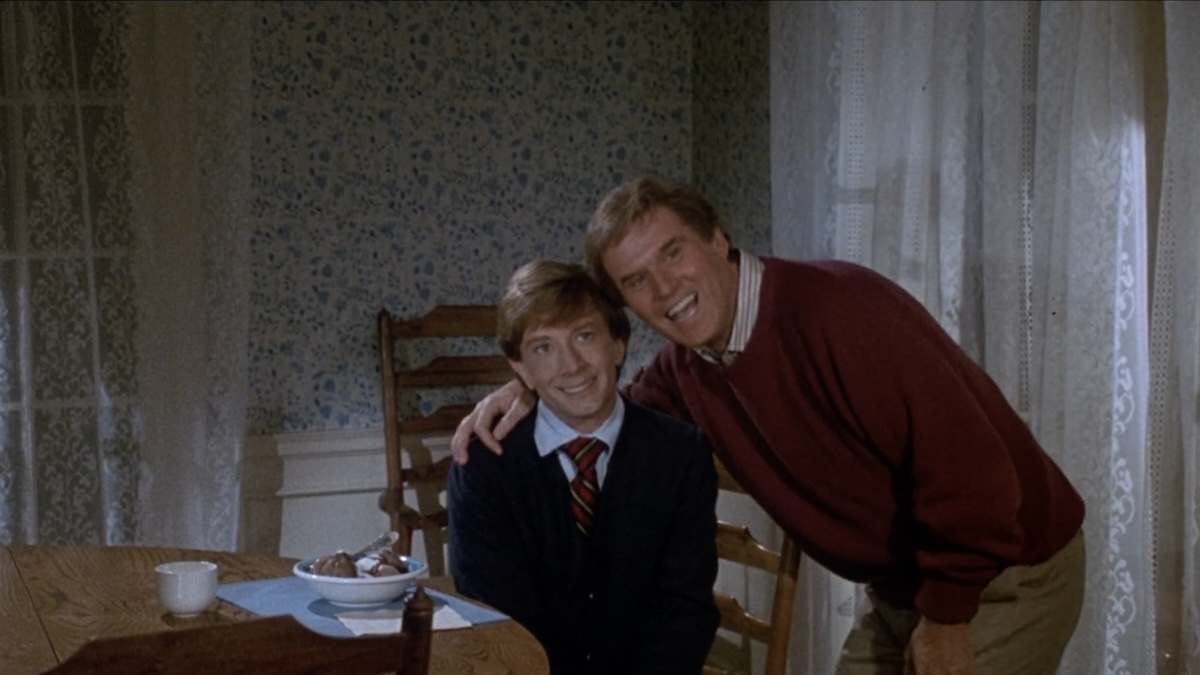
Dennis the Menace always means well towards his neighbour George, but things inevitably go awry, causing consternation. Clifford seems keenly aware of the distress he causes, yet the film later portrays him as oblivious to the consequences. Short’s approach explored “the idea of the non-stop, obsessive nature of getting what you wanted, at any cost”. Granted, children will scream and tantrum, believing this is how the adult world works. But how will Clifford get to Dinosaur World if Martin ends up in jail for a hoax bomb threat to city hall?
The credited writers are Jay Dee Rock and Bobby Van Hayes because the real writers were so mortified by the final product that they opted for pseudonyms. The key production problem was that Kampmann initially sat in the director’s chair, but was let go due to continual creative differences. Paul Flaherty, who also knew Short through SCTV, reluctantly stepped in. He admits, “The first time I heard about the idea, I thought, ‘Oh, that’s gonna bomb.’ I kept that to myself.” Perhaps he should have kept this to himself still, as his previous feature experiences, 18 Again! (1988) and Who’s Harry Crumb? (1989), both have scores below 30% on Rotten Tomatoes.
A firmer hand was needed to establish precisely where the film intended its audience to lie. There are some very silly moments aimed at families, such as Martin downing a drink laced with Tabasco sauce and being dragged along by a dog. These might have worked well following Grodin’s success in Beethoven (1992) and Beethoven’s 2nd (1993). However, there’s also material that seems designed to alienate those very crowds. When Clifford pays off a kid at a gas station for his dinosaur costume to sneak aboard their car, Martin tells the distraught mother, “The last time I saw him [her son], he was counting the money he made in the men’s room!”
A prime example of Clifford‘s missteps is the extraneous Sarah subplot. All it needed to do was capitalise on the talents of its two gifted comedians. Mary Steenburgen, a remarkable talent herself, excels in similar roles as the oblivious mother to bizarre grown-up children, as seen in Elf (2004) and Step Brothers (2008). However, she’s inexplicably whisked away for a night out with their creepy boss (Dabney Coleman) after mocking his advances towards other women. This is further undermined by her scolding a concerned Martin about her obvious dinner date. The scene in his limousine descends into a genuinely uncomfortable moment of sexual harassment, culminating in the anticlimactic act of her ripping off his hairpiece and tossing it out the window. Not only is it unfunny for any audience, but it also fizzles out as she simply returns home unharmed and silent. Martin remains completely oblivious upon seeing his boss in a later scene.
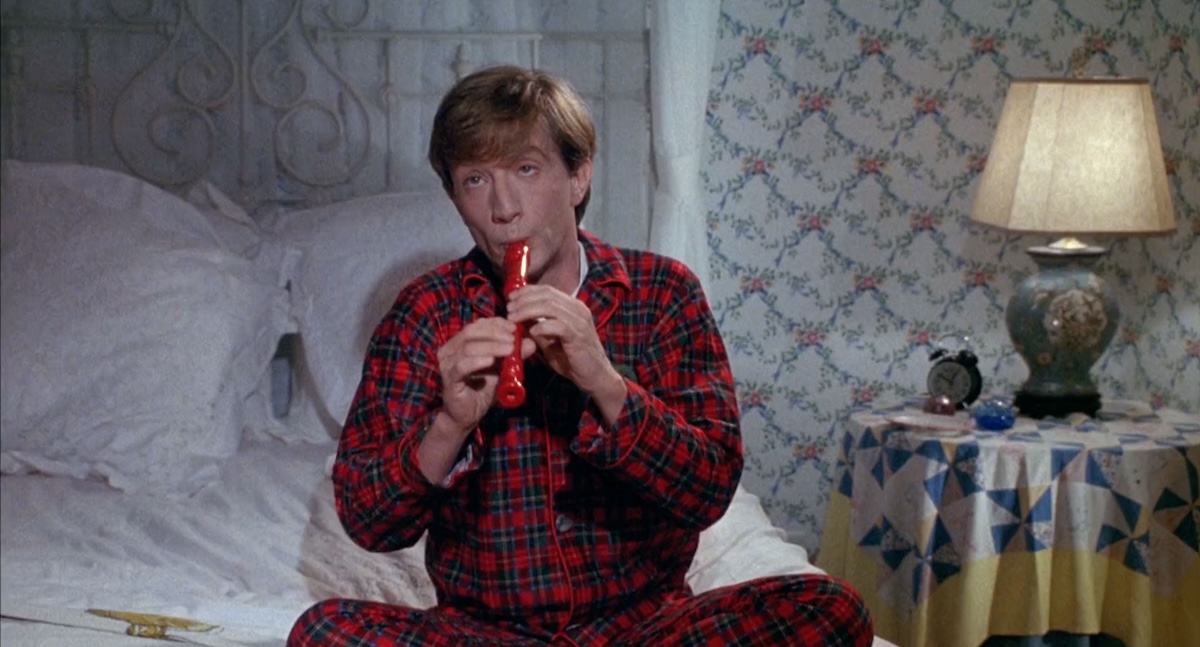
Short praises The Bad Seed as “one of the most perverse films in the world” for its subject matter of killer children and hysterical parents. Clifford only makes half-hearted attempts to recapture that perversity, with a particularly bold climax where Martin threatens to kill Clifford. Then they cop out with a saccharine ending that feels entirely unearned. The build-up to this climax is nothing short of incredible, as Grodin compellingly portrays a man sent over the edge. You forget there’s no suspense given the flashforward wraparound, but his performance convinces you Martin is about to become a murderer.
A trio of culprits pass the buck on Clifford‘s shortcomings rather diplomatically. Flaherty claims, “The rewriting was mostly Marty going in the direction he wanted to go in. I jumped aboard a moving train,” while Short observes, “It was not my intention to jump into the screenwriting of this. It’s not like Innerspace, where you read a script; there’s a beginning, middle, end, and Spielberg’s attached. This was an eccentric idea to begin with,” leading to Kampmann conceding, “I don’t think at the time that I understood as much that the tone was going to change. What is it—is it more of a sketch movie?”
In the same four-year period, Saturday Night Live began a trend of popular sketches being protracted into feature films; Wayne’s World (1992), Wayne’s World 2 (1993), Coneheads (1993), It’s Pat (1994), and several more, with diminishing returns. Clifford feels like it would be better suited to Second City TV, where his abrasive attitude could be contained within a condensed five-minute sketch. Back to School (1986) was the second-highest-grossing comedy of its year, written by Porter and Kampmann. Similarly, it provided a loose framework for Rodney Dangerfield to deliver his material. That worked because you never wanted to throttle Rodney when he acted as the class clown.
What some deride as pointless tedium becomes a uniquely thrilling experience in the absurd for others. The rollercoaster constantly teeters off the rails with no end in sight, testing your patience until the mid-point clash of the two personalities. The confrontation where Martin pleads “Look at me like a person! You can’t do it for more than a few seconds—look at me like a human boy!” is genuinely hysterical. But scenes where Martin covers for Clifford on the bomb prank fall flat as there’s no reason not to hold him accountable. When Grodin gets to unleash incandescent rage towards the brat, it’s a sweet relief. Short’s cartoonish facial contortions work beautifully as they only fuel Grodin’s performance. Flaherty praises, “That’s the moment from the movie that people remember. [Grodin] said, ‘Well, why do we need a read-through? I think we should just show up and be open to whatever happens.'” Almost every negative critic singled out Grodin’s performance here as a highlight. It perfectly captures the premise of Clifford, or any of those films for that matter—“you just can’t win against a kid.”
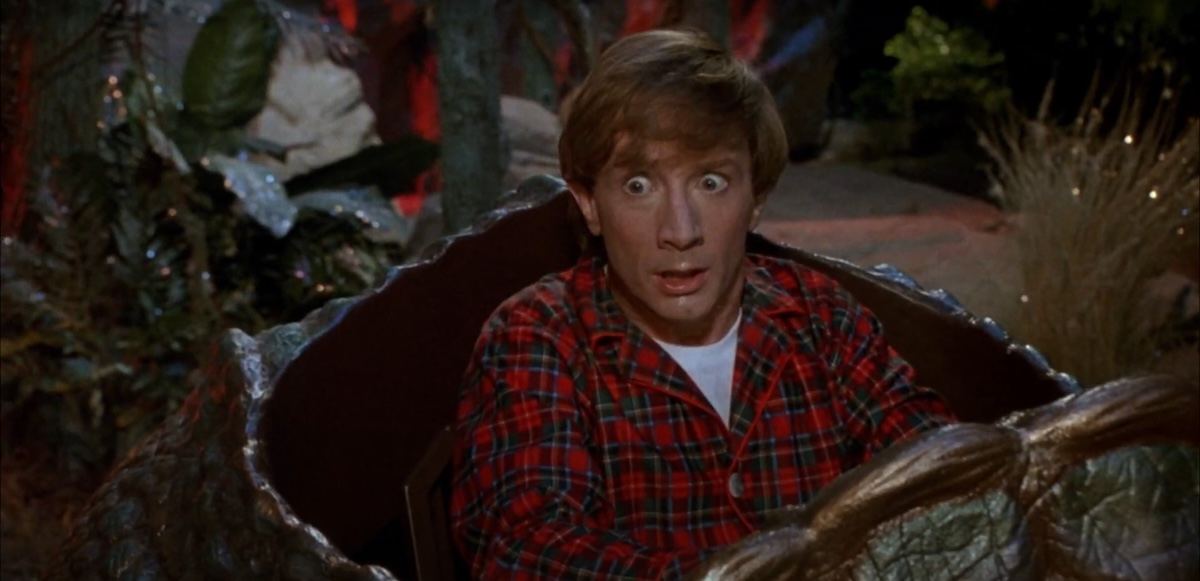
The question I’m left pondering is whether I truly enjoy Clifford, or if the allure surrounding it has enraptured a desire to join the cult fanaticism. There’s no anarchy or counterculture to be found in Clifford. Its weakest faults lie in catering to the mainstream. And yet, the scattershot approach has resonated with a fervent audience. Nicolas Cage once met Short in an airport and confessed, “I destroyed my VHS machine because I rewound that ‘look at me like a human boy’ scene 35 times.” John Oliver recounted on Late Night with Seth Meyers how he received an award “from Clifford” at the Emmys, pushing aside the recent death of the Queen to implore the audience to watch the trailer. The Blank Check podcast had already discussed Clifford once, but comedian Tom Scharpling would only guest star if they covered it again. Writer-director Nancy Meyers insists “it deserves a following. Not a weird one. A special one.”
During the four-year release delay, Martin Short starred in several successes, ranging from Father of the Bride (1991) to Captain Ron (1992). Meanwhile, Grodin and Steenburgen co-starred in It Runs in the Family, which was also filmed in 1990 and dumped alongside Clifford in 1994. Grodin then put comedy on hiatus for 12 years, pursuing his political interests with the issues-based The Charles Grodin Show (1995-99). Sadly, Grodin passed away in 2021, around the same time as the extensive Vulture piece was published. Every interviewee spoke fondly of both him and Clifford, and we can thank him for the film’s continued cult success. When Grodin appeared on The Late Show in 2004, David Letterman jokingly asked if he could get the film anywhere. In typical sardonic style, Grodin quipped, “You can probably only rent a copy at my house.” MGM had purchased Orion Pictures by this point, and to mark the film’s 10th anniversary and capitalise on this joke, they released it on DVD.
The film that started it all, Problem Child, was a huge box office success, grossing $70M and spawning two sequels. Clifford made just $7M on a budget of $19M. This doesn’t tell us anything about the quality of the films themselves, as Problem Child sits at a dismal 0% on Rotten Tomatoes, whereas Clifford is technically 16 times better. Did having an actual child in a family comedy contribute to the success of other films over Clifford? Letterman still only champions one of them, stating, “If they’d had a child actor in that role, I’m not going to see that movie.” Even the critics relented, with Ebert’s closing words: “It’s almost worth seeing just because we’ll never see anything like it again.” He added “I hope” at the end, but Wet Hot American Summer: First Day of Camp (2015), Jumanji: Welcome to the Jungle (2017), Shazam! (2019), and PEN15 (2019-2021) all demonstrated that adult actors can find success playing big kids. I’d say to Clifford in 2050, “mission accomplished, old friend.”
USA | 2024 | 90 MINUTES | 1.85:1 | COLOUR | ENGLISH

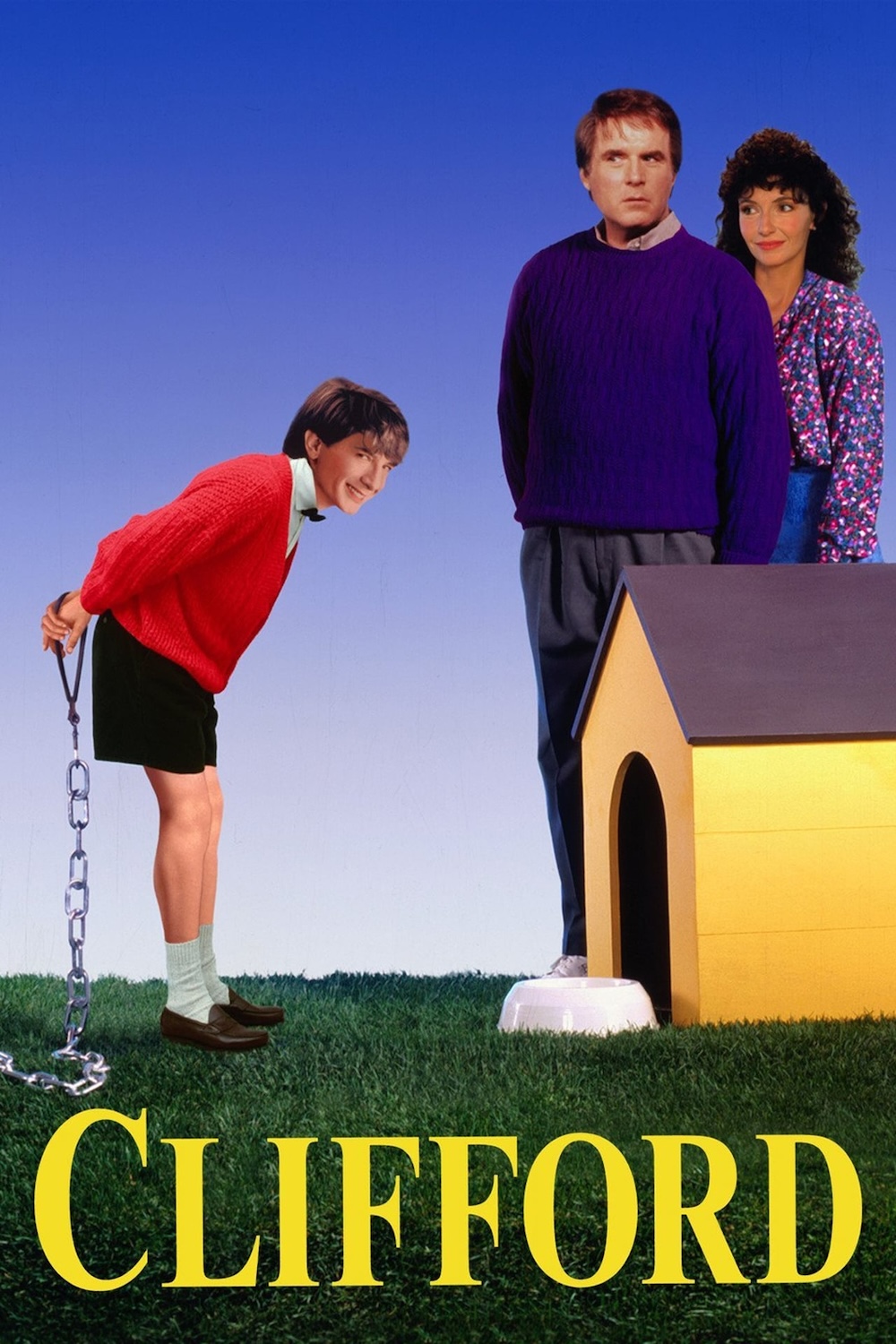
director: Paul Flaherty.
writer: Jay Dee Rock & “Bobby Von Hayes” (i.e. Steven Kampmann).
starring: Martin Short, Charles Grodin, Mary Steenburgen, Dabney Coleman, G.D Spradlin, Anne Jeffreys, Richard King & Jennifer Savidge.
